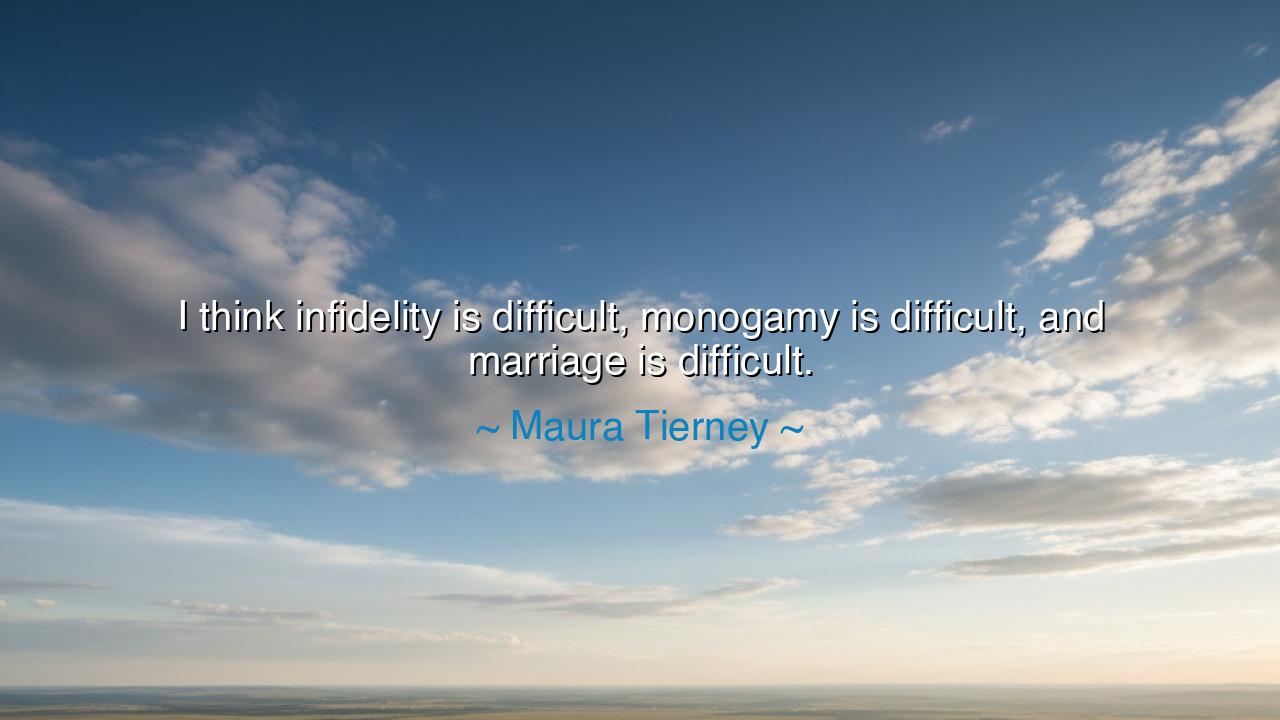
I think infidelity is difficult, monogamy is difficult, and






In the words of Maura Tierney, “I think infidelity is difficult, monogamy is difficult, and marriage is difficult.” This is no passing remark, but a mirror held to the eternal struggle of human love. From the earliest days of our ancestors, men and women have wrestled with the laws of desire, loyalty, and union. To betray is painful, yet to remain faithful demands strength; and to bind one’s life to another in marriage is to enter a field where storms are certain to rise. Tierney speaks not merely of hardship, but of the weight and worth of choices we make in the realm of the heart.
The ancients often likened the soul’s passions to wild horses. Infidelity, like a horse unbridled, rushes into danger. It shatters trust and leaves behind a trail of sorrow. Yet those who live in betrayal are themselves torn by the burden of deception. No heart escapes unscathed. On the other hand, monogamy is not without its own trials. To hold fast to one partner requires patience, sacrifice, and the courage to see not only the light but also the shadow of the beloved. Thus, even fidelity can feel like a battlefield, where the fight is not against the partner, but against one’s own restless nature.
Consider the tale of King David of Israel, beloved of God, whose triumphs were mighty yet whose fall came through infidelity. He strayed with Bathsheba, and though he repented, the pain rippled across his kingdom and family. His story is a testament that even the greatest are not spared from the difficulties Tierney names. For David found infidelity difficult in its consequences, monogamy difficult in its demands, and marriage difficult in its fragility. His life was a lesson carved into history: that the heart is both a throne and a battlefield.
Yet, let us not despair. For difficulty does not mean futility. The ancients also taught that the road which is steep and rugged leads to the summit where gods dwell. Marriage, though fraught with storms, is also the ship that carries two souls across the sea of life. Its hardships are the hammer that forges character, its trials the fire that tempers love. To endure in marriage is not to escape struggle, but to find meaning within it.
In Rome, the philosopher Seneca wrote that no great thing is easy, and so it is with the union of two lives. He observed that adversity is the school of virtue. Thus, when Tierney says marriage is difficult, she echoes wisdom as old as the stones of Athens: difficulty is the very soil in which greatness grows. A bond without struggle is shallow; a bond weathered through storms becomes unbreakable.
What then is the lesson? It is this: do not flee from difficulty, for it is the teacher of love. If you choose fidelity, walk it with honor. If you fail, seek truth and repentance. If you marry, know that hardship is not a curse, but a path to depth and beauty. In every choice of love, you will meet difficulty, but within that difficulty lies the possibility of greatness.
Practical actions follow from this truth. Be honest with your partner, for lies plant seeds of ruin. Cultivate patience, for time softens anger and strengthens affection. Nurture gratitude, for love flourishes when one counts blessings instead of faults. And when storms arise, as they always will, stand firm together rather than apart. Like sailors who lash themselves to the mast in a tempest, hold fast to your vows until the skies clear.
Thus, let Maura Tierney’s words be remembered not as lament, but as a call to courage. For in facing the difficulty of infidelity, monogamy, and marriage, we face not just the nature of love, but the nature of life itself: hard, yes, but also sacred, worthy, and radiant with the light of meaning.






AAdministratorAdministrator
Welcome, honored guests. Please leave a comment, we will respond soon